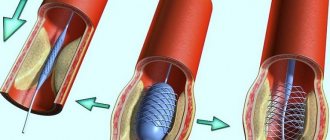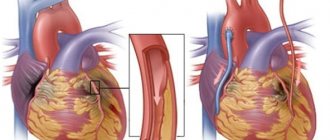Heart bypass surgery is performed quite often. This is due, first of all, to the increase in the number of patients suffering from problems with the blood supply to the heart muscle and the effectiveness of this treatment method. This type of surgery gives a high chance of a full life in the future and reduces the risk of myocardial infarction. However, questions arise as to whether the patient will be able to work in the same place after bypass surgery, what complications are possible, and whether they give disability after bypass surgery of the heart vessels. Let's consider these questions.
Complications arising from heart bypass surgery
Almost every surgical procedure carries a risk of complications for the patient, especially heart surgery.
Despite the positive dynamics of coronary artery bypass grafting (CABG), patients may experience the following complications:
- bleeding in the area of the surgical wound,
- bleeding and infection of the wound at the site of the vein incision (usually the thigh area),
- dysfunction of the shunt due to its narrowing,
- opening of seams,
- pain and heat in the chest area,
- deterioration of cognitive processes,
- thrombosis of venous beds,
- the occurrence of angina attacks,
- disruption of blood supply to the brain,
- general weakness of the body.
Important! To eliminate the possibility of complications, you must adhere to strict rules for the postoperative recovery period given by your doctor.
Heart bypass disability after surgery
Many patients who undergo surgery believe that they will develop disabilities and limitations in their physical abilities in the future. However, the disability group is assigned to only 7-8% of patients. In most cases (85%) they are given temporary disability (6-12 months) with the assignment of a third disability group.
To obtain a disability group, the patient undergoes a medical commission. To make a decision, the commission takes into account the following factors:
- patient's age,
- heart disease before surgery,
- the presence of chronic diseases, heart failure,
- high risk of heart attack
- state of the body before and after surgery,
- serious thinking problems and memory impairment.
Read also: Application to declare a minor fully capable
The first disability group is assigned to patients under the following circumstances:
- angina pectoris with frequent attacks (several times a day),
- symptoms of chronic heart failure,
- severe heart rhythm disturbances.
The second group is assigned in the following cases:
- increasing heart failure,
- daily attacks of angina.
Disability after coronary artery bypass grafting of the third group is assigned when:
- periodic attacks of angina pectoris,
- moderate cardiac dysfunction,
- constant general malaise,
- disruption of memory and thinking processes.
Only if there are several symptoms after bypass surgery, a person will be given disability group 1, 2 or 3.
Indications for disability in adults and children
There are no clear indications and a complete list of diseases for which a child or adult can become disabled. Each case is individual and is considered separately. And this is a very pressing issue in our country, because absurd situations happen when a person who can barely stand on his feet has to go through several authorities to prove his inability to work.
If we talk about heart diseases and cardiac operations, then everything here is also quite blurry. In Soviet times, people with the third stage of hypertension and pathological changes in target organs became disabled people; with a pronounced deterioration in the functioning of the heart muscle; with vices; with severe heart failure and associated lung diseases. Everything seems clear, but it is impossible to say for sure whether a person who has suffered, for example, severe myocarditis will be given disability. First you need to conduct a full examination, and then draw conclusions.
By the way! Disputes about the assignment of disability often arise precisely on this basis. When one person is given a group, but another, who has exactly the same diagnosis, is not recognized as disabled.
When receiving disability, the patient's age also matters. For example, children with heart defects or after severe cardiac operations become disabled from childhood. This is a stable status that gives the right to certain benefits. Disability can be canceled or a group assigned only upon reaching 18 years of age. Then the size of payments will change, and the person will be able to decide his future fate in terms of study and future work.
Where disabled people do not work
Having a disability group, a person works with certain restrictions. Of course, it is necessary to take into account the patient’s profession and work schedule.
Important! Like any other employee of the organization, a disabled person cannot be limited in labor rights.
After heart bypass surgery, a person is given a disability group, and he will not be able to work in hazardous industries, on night shifts or daily work, unload cargo or lift heavy objects. Restrictions also apply to military service and work in the police department.
It is possible to reach agreement with the employer on the work schedule and duration of work. However, disability relief does not apply to the quality of work performed.
Legitimate reasons for refusal
Keep in mind that MSEC may legally refuse to obtain disability. This happens if:
- treatment and rehabilitation of the patient have been carried out to a sufficient extent, which prevents the possibility of relapses or complications;
- the patient is fully able to work and can fully care for himself;
- the specialty of the certified person does not require significant psycho-emotional stress, concentration or change of place of work.
In case of refusal, the patient has the right to re-apply to the examination bureau for examination in the same manner. If even after this the disability group is not assigned, you can submit documents to the Federal MSEC body, and then to the court.
What opportunities/benefits do disability groups provide?
Disability groups mean receiving preferential pensions and paying benefits.
Third group
Disability groups mean receiving preferential pensions and paying benefits.
At the same time, the third disability group provides the following benefits:
- discounts on public transport,
- discounts on medical care, purchase of medical equipment and medicines,
- preferential spa treatment,
- benefits regarding tax payments,
- benefits for housing and communal services,
- employment with a part-time schedule,
- the right to independently choose the time of vacation.
Second group
The second disability group provides the following benefits:
- free travel on public transport,
- provision of medications prescribed by the doctor,
- preferential spa treatment,
- provision of medical equipment,
- dental prosthetics,
- the right of priority admission to educational institutions of higher and secondary education,
- right to an increased scholarship,
- a working week shortened to 35 hours for a working disabled person of the second group,
- receiving vacation up to 60 days,
- exemption from property tax inherited
- other tax breaks.
First group
People with the first disability group enjoy the following benefits:
- free travel on public transport,
- free medicines, medical equipment and dressings prescribed by the doctor,
- free spa treatment and recreation once a year for 3 years from the date of receipt of the group,
- free prosthetics, incl. and dental
- free orthopedic shoes,
- extraordinary admission to educational institutions of higher and secondary education,
- increased scholarships,
- for working disabled people a shortened working week of up to 35 hours,
- receiving vacation up to 60 days,
- exemption from property tax inherited
- other tax breaks.
Read also: Rules for registering refusal of hospitalization: sample application and law
The procedure for registering a disability group according to the heart
To begin with, a person after CABG is contacted by a cardiologist to receive a package note, a referral for tests and instrumental examination.
Next, the patient makes a round to the required doctors, takes tests and undergoes an examination.
To receive a group, the patient needs:
- perform a complete examination of the cardiovascular system,
- carry out an examination to identify other systemic diseases,
- go to your doctor with the results and get a referral to a commission,
- undergo a medical and social examination, a medical commission, which will determine the rationale for assigning a particular disability group and set the terms of disability.
The following list of documents is also prepared:
- a copy of the work record, if the person worked before the operation,
- passport,
- outpatient card,
- patient's application for examination,
- certified epicrises from hospitals.
Next, a meeting of the medical commission takes place and a conclusion is made. If a disability group is assigned, the person is given the necessary certificates and a rehabilitation program.
Attention! If the patient does not agree with the decision, it is appealed to a higher commission or through the court.
Clinical case
Patient G., 55 years old, was admitted to the emergency department with complaints of intense, burning pain in the chest, which radiated to the lower jaw and left arm, as well as fear of death.
Taking nitroglycerin did not reduce the discomfort. History: angina pectoris, diagnosed 5 years ago, prescribed therapy was taken irregularly. Objectively: pale skin, hyperhidrosis, heart rate 100 beats/min, severe shortness of breath at rest, cyanosis of the nasolabial triangle, third and fourth heart sounds appeared, blood pressure 160/100 mm Hg. Preliminary diagnosis: “Myocardial infarction.” The diagnosis was confirmed using: dynamic ECG, blood test for markers of infarction (troponins T and I, CK, CF-CK), clinical and biochemical blood tests, Echo-CG. The patient received: “Actelise”, “Aspirin-cardio”, “Heparin”, “Morphine”, GIK, “Bisoprolol”, “Erinit”, “Preductal”, “Quercetin”.
After treatment and a four-month course of rehabilitation, the patient still had swelling in his legs, shortness of breath at rest, and attacks of angina, so he was referred to MSEC. After the examination procedure, he was assigned disability group II for a period of 1 year.
Medical and social examination
Coronary artery bypass grafting
CABG is a surgical intervention to perform operations on the vessels of the heart in order to restore blood flow in the coronary bed.
One of the main indications for surgery is coronary heart disease. Additional indications for performing CABG on a patient:
- persistent manifestations of angina pectoris that cannot be corrected by drug treatment,
- significant narrowing of the coronary bed,
- high risk of myocardial infarction.
In the classic version, coronary artery bypass surgery is a rather complex and dangerous surgical intervention for the patient, consisting of the following main stages:
- To begin with, the patient is subjected to general anesthesia.
- Next, the chest is opened using a median sternotomy.
- The pericardial cavity is opened, and in parallel with the process, a vessel is taken, which will later be used as a shunt.
- After a series of measures, the heart is connected to a heart-lung machine.
- Next, a shunt is applied and the heart is removed from the artificial blood supply and, under the conditions of a contracting organ, the aorta and interventricular artery are connected by a shunt.
- The blood supply to the myocardium is restored, the chest is sutured.
Read also: Responsibilities of care of adult able-bodied children for disabled parents
Disability after cardiac bypass surgery
Having undergone heart bypass surgery is not necessarily a reason for disability. CABG allows the heart to restore function and the patient to return to their normal lifestyle.
If after the operation the heart function is restored, ultrasound reveals no abnormalities or they are insignificant, and the patient’s condition is good, the person is not considered disabled. However, bypass surgery is a reason to prescribe a medical rehabilitation commission (MREC), which includes an examination by expert doctors headed by the chairman.
The commission analyzes the medical history, examination results, and the patient’s condition and makes a decision on the presence or absence of symptoms indicating disability. If there are pronounced disturbances in the functioning of the cardiovascular system, difficulties in carrying out work activities and performing the necessary actions for self-care, a person is assigned a disability group. In case of persistent and irreversible changes in the functioning of the heart and the age of the patient (in women over 55 years old, in men over 60 years old), a lifelong group may be assigned. But this happens quite rarely.
Do they give special status after a heart attack?
You can get disability after myocardial infarction and stenting if there are complications of the disease. To confirm them, you need to undergo an examination and submit an application to an expert commission, which makes the appropriate decision.
In theory, obtaining status is not difficult, but you need to be prepared to visit doctors and get tested. It can be difficult to do this on your own due to a heart attack. It’s good if there is a friend or relative nearby who is ready to help. It is better to make an appointment in advance to avoid tiring waiting in lines.
To avoid wasting time on paperwork, first consult with your doctor. Let a specialist assess your current condition and prospects for rehabilitation. Be also prepared for the fact that members of the expert commission may require additional examination and include narrow specialists in the list.











